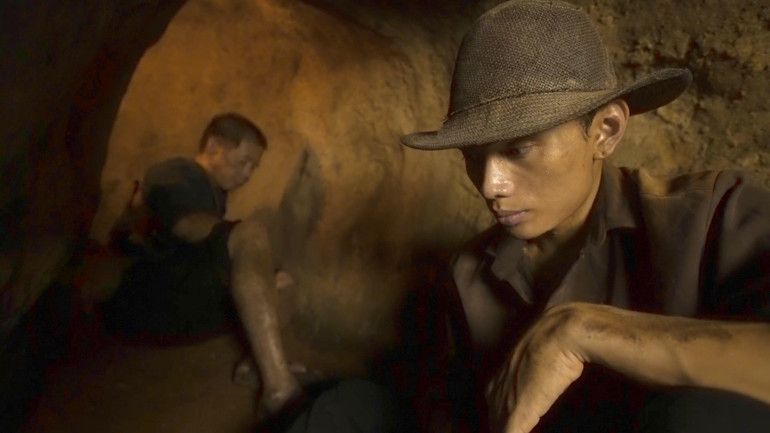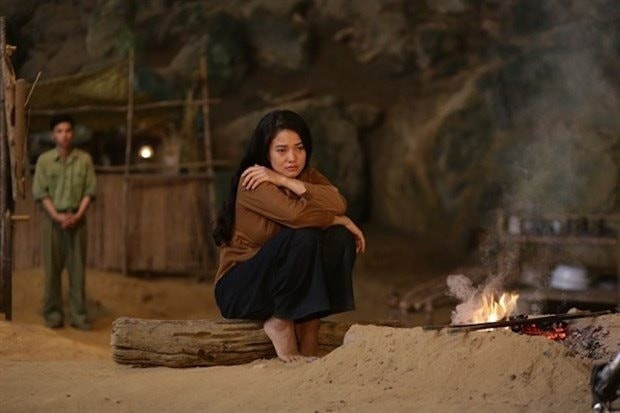As anticipated, director Bui Thac Chuyen’s acclaimed war film Tunnel: Sun in the Dark was the most analyzed work at the seminar “The legacy of Vietnamese war films after national reunification.”
This discussion was held as part of the 2025 Da Nang Asian Film Festival.
A remarkable success story

Associate Professor Dr. Pham Xuan Thach of the Hanoi National University’s School of Interdisciplinary Sciences and Arts described the box office performance of Tunnel: Sun in the Dark as legendary.
The film officially premiered nationwide on April 4 and concluded its theatrical run on May 31. According to press reports, it grossed approximately VND 172 billion (around USD 6.7 million) in just two months.
“In comparison, Peach Blossom, Pho and Piano, a film of the same genre released in 2024, earned only VND 20.8 billion (USD 810,000),” said Dr. Pham Xuan Thach. “This makes The tunnel a box office legend.”
Although exact audience figures are unavailable, dividing the total revenue by the average ticket price in Vietnam (ranging from VND 80,000 to 120,000) suggests that the film attracted around 1.7 million viewers in theaters alone.
“In contrast, even the most acclaimed or controversial contemporary Vietnamese novels - those receiving major awards and reprints - rarely surpass a cumulative print run of 10,000 copies. These numbers illustrate the larger audience reach of cinema compared to literature,” Dr. Pham Xuan Thach observed.
Screenwriter Trinh Thanh Nha praised Tunnel: Sun in the Dark as a quintessential heroic war film. Director Bui Thac Chuyen’s decision to focus on a suffocatingly narrow setting intensified the characters’ psychological need to resist and overcome the pressure they temporarily accepted for survival and victory.
She noted that Bui Thac Chuyen spent a decade developing the script, during which he also produced a 3D documentary on the film’s location. The project’s production budget exceeded VND 50 billion (around USD 2 million), with over half that amount also invested in marketing.
“While the content is not entirely new, the film’s realism, well-structured dramatic sequences, and intense scenes - ranging from bombings to underground flooding - imbued the work with Chuyen’s signature style, particularly in its sensually nuanced portrayals. This helped the film gain significant public attention,” Trinh Thanh Nha said.
Author Chau La Viet emphasized the film’s epic and heroic tone in recalling the struggle for national independence. Its record-breaking revenue also marked it as the highest-grossing revolutionary historical film in Vietnam.
Fresh perspectives from young directors

With decades having passed since the war, new voices - mostly from directors born after the conflict - are offering fresh cinematic perspectives on the subject.
Director Dao Duy Phuc said that by the 2000s, three decades after the war, this temporal distance allowed young filmmakers to adopt a more reflective and objective approach. War, he noted, is not only about glory but also its hidden traumas.
Today’s directors face the challenge of revitalizing war and revolutionary themes by staying true to history while connecting with contemporary aesthetics.
According to Dao Duy Phuc, younger directors bring a humanistic, less mythologized viewpoint to war stories. Without direct experience of the conflict, they avoid grandiose heroics and instead focus on post-war consequences - silent struggles, fractured lives, and lingering pain.
He cited young director Dang Thai Huyen’s The return (2015), which tells the story of a female soldier returning from war to confront loss, trauma, and alienation in peacetime. Huyen devoted extraordinary effort to prove that the younger generation can skillfully portray revolutionary themes.
Huyen’s upcoming film Red rain, also about the revolutionary war, is slated for release on September 2.
Dao Duy Phuc also mentioned director Bui Tuan Dung, known for The mail route, The legendary writers, Uncle Chin in Siam, and The road to Dien Bien. Dung has redefined a genre once dominated by veteran filmmakers by creating high-quality, character-driven narratives where war serves merely as a backdrop.
Director Dang Thai Huyen observed that post-1975 war films have evolved to become dialogical, allowing for broader explorations of war’s multifaceted reality.
War films are no longer a creative “forbidden zone.” New perspectives now include those of the enemy, or narratives previously unexplored. No longer limited to a singular viewpoint, today’s war films are commercially driven, ticketed, and designed to engage audiences in meaningful dialogue.
“This honest dialogue with audiences gives filmmakers the opportunity to create better, more relevant cinematic programs,” said Huyen.
These fresh perspectives are gradually transforming how war-themed films reach audiences.
Dr. Pham Xuan Thach noted that today’s filmmakers have redefined the heroic war narrative, offering more diverse and nuanced portrayals of the past and complex human experiences in wartime - particularly the psychological aftermath.
“However, to foster this film genre’s growth, there must be openness in both regulatory mechanisms and investment. This will encourage independent cinema and cultivate a broader, more receptive audience for war-themed films,” Dr. Pham Xuan Thach concluded.
Director Dang Thai Huyen agreed, emphasizing that future investments in revolutionary war films should focus not on glorifying past victories, but on uncovering untold stories - prompting new dialogues with the past and among filmmakers themselves.
Nhan Dan